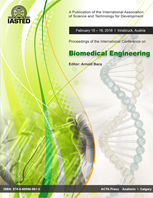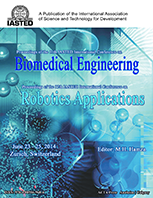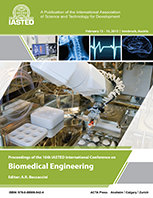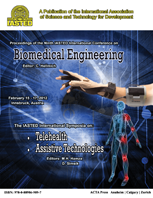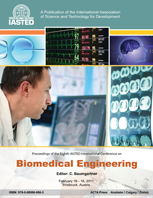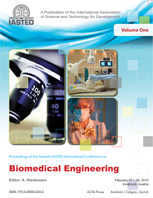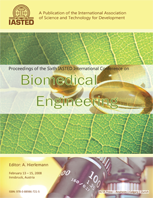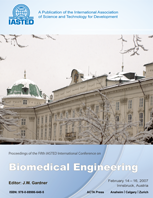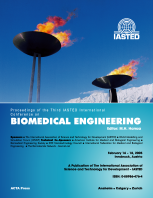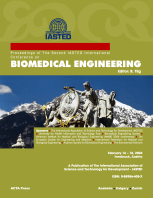The 10th IASTED International Conference on
Biomedical Engineering
BioMed 2013
February 13 – 15, 2013
Innsbruck, Austria
SPECIAL SESSION
Mathematical Modeling in Biomedical Engineering: Current Trends and Challenges
Abstract
The role of mathematical modeling in biomedical engineering is ever increasing - and mainly so where a fruitful interplay between computational and experimental research is fostered. Coming from different areas of biomedical simulation, the special session organizers particularly welcome contributions on multiscale modeling in physiological processes, structural biology, biomechanics, regeneration and adaptation, hemodynamics, fluid-structure interaction, and poromechanics. This is, however, no restriction of topics, since the nucleation point of the Special Session will remain the reasonable use of mathematical modeling to elucidate biomedical engineering problems.Target Audience
All researchers, scientists and practitioners working in the field of mathematical modeling in biomedical engineering.Authors submitting papers to this special session must follow the initial paper formatting requirements. All papers must be submitted by October 29, 2012.
Biographies of the Participants

Christian Hellmich is Professor of Strength of Materials and Computational Mechanics at the Vienna University of Technology (TU Wien), Vienna, Austria. He received his MSc (1995) and PhD degrees (1999) from TU Wien, where he also obtained his habilitation degree for Mechanics of Materials and Biomechanics, in 2004. Since then, he served TU Wien as associate Professor, before having been appointed Full Professor in 2011, serving now as the Head of the Institute for Mechanics of Materials and Structures. From 2000 - 2002, he worked as a Postdoctoral Associate at Massachusetts Institute of Technology, Department for Civil and Environmental Engineering, supporting the establishment of the field of multiscale mechanics of bone.
Dr. Hellmich is the author of more than 80 publications in refereed journals (h-index=20), of 19 book chapters, and of more than 190 contributions to proceedings of international conferences.
He has been reviewing for 65 scientific journals and 10 Science Foundations, he is in the Editorial Board of 8 Scientific Journals, serving also as Associate Editor of the Journal of Engineering Mechanics (ASCE) and as Corresponding Editor of Computer Methods in Engineering and Sciences. His main research interests are centered around multiscale mechanics of materials and structures, with civil engineering and biomedical applications, which concern geomaterials and tunneling, wood, bone and the skeletal system, as well as tissue engineering strategies. Related scientific fields include micromechanics, poromechanics, mechanobiology, and systems biology.
His work was appraised by several internationally recognized prizes, including the 2008 Zienkiewicz Award for Young Scientists in Computational Engineering Sciences, of the European Community on Computational Methods in Applied Sciences (ECCOMAS), an ERC Grant from the European Research Council, awarded in 2010; and the 2011 Walter L Huber Rsearch Prize awarded by the American Society of Civil Engineers (ASCE).

Hans Van Oosterwyck (DOB 02.02.1972) holds an MSc degree in Materials Engineering (1995) and a PhD degree in Engineering (2000), both obtained at KU Leuven (Leuven, Belgium). He has been a postdoctoral fellow at the AO Research Institute (Davos, Switzerland) in 2004-2005 and a visiting scientist at the University of Zaragoza (Spain) for 8 months in 2009.
He currently is a professor at the Biomechanics section (Mechanical Engineering Department) at KU Leuven, where he is heading the Mechanobiology and Tissue Engineering research group, and a visiting professor at Ghent University (Ghent, Belgium). He is a member of the management board of Prometheus, the Leuven R&D Division for Skeletal Tissue Engineering. He was recently (2012) awarded an ERC Starting Grant on the role of cell-matrix interaction in angiogenesis. He is (co-)author of 59 ISI indexed journal papers and has an h-index of 16. His research focuses on the development of quantitative tools for unraveling the role of the microenvironment for cell fate, in particular the development of multiscale computational models for studying the importance of mechanics and mass transport for bone regeneration and angiogenesis.
Prof. Van Oosterwyck is a member of the European Society of Biomechanics (ESB) and has been an ESB Council Member since 2006. Currently he is the President of the ESB (2012-2014).

Nenad Filipovic is Professor of Biomechanics and Informatics at the Mechanical Engineering Faculty of the University of Kragujevac (Serbia) and Research Associated at Harvard School of Public Health at University of Harvard (USA). His research interests are in the area of fluid mechanics, coupled problems; fluid-structure interaction, heat transfer; biofluid mechanics; biomechanics, multi-scale modeling, discrete modeling, molecular dynamics, computational chemistry and bioprocess modeling. He is author and co-author 6 textbooks and 1 monograph on English language, over 50 publications in peer review journals and over 5 software for modeling with finite element method and discrete methods from fluid mechanics and multiphysics. He is Director of Center for Bioengineering at University of Kragujevac and leads joint research projects with Harvard University and University of Texas in area of bio-nano-medicine computer simulation. He also leads a number of national and international projects in area of bioengineering. He was awarded with Young Scientist Award on the Second MIT Conference on Computational Fluid & Solid Mechanics, (Ed. K.J. Bathe), Boston, USA. He is a Managing Editor for Journal of Serbian Society for Computational Mechanics and member of European Society of Biomechanics (ESB) and European Society for Artificial Organs (ESAO).
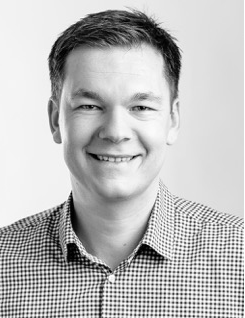
Dr. Stefan Scheiner obtained his PhD in Engineering Sciences from the Vienna University of Technology in Austria. He is currently a post-doctoral research assistant, also at the Vienna University of Technology in Austria.
Submissions
Please email all submissions to christian.hellmich@tuwien.ac.at by October 29, 2012. Authors MUST include their full contact information in the email.
Important Deadlines
| Latest Submissions Due | October 29, 2012 | |
| Notification of Acceptance Starting | November 15, 2012 | |
| Final Manuscripts Due | December 3, 2012 | |
| Registration Deadline | December 6, 2012 |
Papers will be reviewed on an ongoing basis. Authors who submit early will receive their feedback and notification early.






